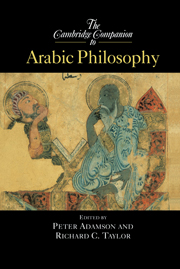Book contents
- Frontmatter
- 1 Introduction
- 2 Greek into Arabic
- 3 Al-Kindī and the reception of Greek philosophy
- 4 Al-Fāarābī and the philosophical curriculum
- 5 The Ismāīlīs
- 6 Avicenna and the Avicennian Tradition
- 7 Al-Ghazālī
- 8 Philosophy in Andalusia
- 9 Averroes
- 10 Suhrawardī and Illuminationism
- 11 Mysticism and philosophy
- 12 Logic
- 13 Ethical and political philosophy
- 14 Natural philosophy
- 15 Psychology
- 16 Metaphysics
- 17 Islamic philosophy and Jewish philosophy
- 18 Arabic into Latin
- 19 Recent trends in Arabic and Persian philosophy
- Select bibliography and further reading
- Index
6 - Avicenna and the Avicennian Tradition
Published online by Cambridge University Press: 28 May 2006
- Frontmatter
- 1 Introduction
- 2 Greek into Arabic
- 3 Al-Kindī and the reception of Greek philosophy
- 4 Al-Fāarābī and the philosophical curriculum
- 5 The Ismāīlīs
- 6 Avicenna and the Avicennian Tradition
- 7 Al-Ghazālī
- 8 Philosophy in Andalusia
- 9 Averroes
- 10 Suhrawardī and Illuminationism
- 11 Mysticism and philosophy
- 12 Logic
- 13 Ethical and political philosophy
- 14 Natural philosophy
- 15 Psychology
- 16 Metaphysics
- 17 Islamic philosophy and Jewish philosophy
- 18 Arabic into Latin
- 19 Recent trends in Arabic and Persian philosophy
- Select bibliography and further reading
- Index
Summary
The scope of this chapter is dauntingly broad, since Avicenna was the central figure in the history of Arabic-Islamic philosophy. Before Avicenna, falsafa (Arabic Aristotelian and Neoplatonic philosophy) and kalām (Islamic doctrinal theology) were distinct strands of thought, even though a good deal of cross-fertilization took place between them. After Avicenna, by contrast, the two strands fused together and post-Avicennian kalām emerged as a truly Islamic philosophy, a synthesis of Avicenna’s metaphysics and Muslim doctrine.
To talk about the sources, evolution, and influence of Avicenna’s ideas is, in fact, to talk about over two thousand years of philosophical activity. Avicenna’s sources begin with Aristotle in the fourth century B.C.E. and include the late antique Greek Aristotle commentators, both Peripatetic and Neoplatonist. Avicenna himself was extremely prolific: between 40 and 275 titles have been attributed to him by bibliographers ranging from his student Jūzjānī to the late Egyptian scholar Georges Anawati, with approximately 130 reckoned to be authentic by the Iranian scholar Yahyā Mahdavī. What is more, his ideas evolved during the course of his career,with the result that, as with Plato’s and Aristotle’s thought, Avicenna’s philosophy will often resist our attempts to systematize it, and his position on a number of important philosophical issues will appear frustratingly underdetermined. As for Avicenna’s impact, it was felt acutely in both the Islamic world and in Christian Europe.
- Type
- Chapter
- Information
- The Cambridge Companion to Arabic Philosophy , pp. 92 - 136Publisher: Cambridge University PressPrint publication year: 2004
- 7
- Cited by



